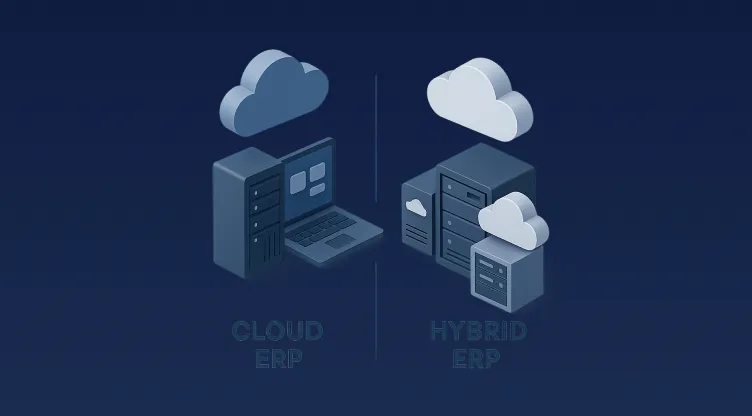In today’s fast-moving business world, choosing the right ERP system is no longer just a technical decision—it’s a core part of your growth plan. As industries across the MENA region modernise operations, many face a familiar question: should you go for a Cloud ERP or a Hybrid ERP?
Both have their strengths. But which one is better for your business model, compliance environment, and growth pace?
Let’s break it down in simple terms.
ERP Snapshot: What You Need to Know Quickly
- Smart Choice Guide
- Cloud ERP is best for speed, scale, and ease of use.
- Hybrid ERP offers flexibility and control for complex operations.
- Your choice depends on your industry, infrastructure, and local data regulations.
What Is ERP, Really?
An ERP (Enterprise Resource Planning) system connects all parts of your business. From managing orders to tracking inventory, handling finance, or syncing sales—it’s the operational brain of your company.
Well-known ERP systems include SAP, Oracle NetSuite, and Microsoft Dynamics. Meanwhile, newer platforms like Omniful offer ERP features built specifically for omnichannel retail and logistics, especially within markets like Saudi Arabia and the UAE.
Why Cloud ERP Is a Smart Fit for Digital-First Brands
Cloud ERP runs entirely online. Your data is hosted on secure servers, and users can access the system from anywhere with a login.
Top Reasons to Choose Cloud ERP
- Speed to launch: Setup is fast, with no hardware needed.
- Affordability: Monthly pricing makes it accessible for SMEs.
- Mobility: Teams in different cities or countries can work in sync.
- Automatic updates: No manual patching or upgrades needed.
This setup is ideal for fast-growing companies or brands operating in multiple regions with limited IT support.
When Hybrid ERP Is the Better Route
Hybrid ERP mixes both cloud-based and on-premise systems. It lets you keep sensitive or critical operations in-house while taking advantage of cloud for less complex modules.
Why Hybrid ERP Works for Some
- Stronger compliance: Ideal where data must stay within local borders.
- Custom setup: Useful when existing legacy systems are still in play.
- Greater control: Keeps high-volume or regulated operations in-house.
- Stability: Offers backup when internet or connectivity is unreliable.
Hybrid ERP is often chosen by large logistics firms, 3PL providers, or retailers managing their own warehouses and stores.
Important ERP Modules You Should Look For
Your ERP isn’t just software—it’s a toolkit. Whether you go cloud or hybrid, make sure your system offers these modules:
| Module | Business Use |
|---|---|
| Inventory | Keeps track of stock across locations. |
| Order Management | Streamlines incoming orders from multiple sales points. |
| Supply Chain | Handles procurement, suppliers, and PO lifecycle. |
| POS Sync | Connects physical stores with digital platforms. |
| Returns & Refunds | Smooth process for product returns or exchanges. |
Providers like Omniful integrate all these tools with regional compliance features and fulfilment capabilities tailored to the Gulf region.
Real-World Example: Cloud ERP in Action
A D2C skincare brand expanding across the GCC uses a cloud ERP system to manage online orders, inventory, and customer data from one place. The team can access live dashboards while working remotely, helping them scale quickly without needing extra IT resources.
Real-World Example: Why Hybrid ERP Made Sense
A 3PL fulfilment company operating in Saudi Arabia opted for a hybrid ERP setup. Their warehouse and transport operations run on local servers due to data security laws, while invoicing and reporting are cloud-based to ensure flexibility and remote access.
Cloud vs Hybrid ERP: Feature Comparison
| Factor | Cloud ERP | Hybrid ERP |
|---|---|---|
| Setup Time | Quick | Moderate to Long |
| Budget | Lower starting costs | Higher setup costs |
| Control | Minimal (vendor-managed) | High (self-managed modules) |
| Compliance Support | Basic | Advanced, regional |
| Scalability | High | Depends on on-premise resources |
| Integration Ease | Best with modern tools | Needs tailored connectors |
Choosing Based on Your ERP Needs, Not Just Buzzwords
It’s tempting to search for terms like “erp login” or “erp modules” and pick the first shiny tool you see. But your choice should reflect your business goals, team capacity, and local environment.
Ask yourself:
- Do we need to control where our data is stored?
- Are we ready to manage infrastructure or prefer hands-off?
- Will our system need to scale across new locations fast?
- Are we working with sensitive information or regulated workflows?
Final Thoughts: What’s Right for You?
Cloud ERP is perfect if you want a light, flexible setup that grows with your business. Hybrid ERP suits those with heavier infrastructure, strict compliance needs, or legacy software that can’t be replaced overnight.
Whichever you choose, look for a vendor that understands the nuances of your region—like Arabic language support, ZATCA readiness, and integration with local platforms like Zid, Salla, or Noon.
Take the Next Step: Future-Proof Your Operations
Modern business demands real-time coordination, seamless order flows, and reliable data. Whether you're scaling a local retail network or running high-volume fulfilment centres, your ERP must help—not hinder—your growth.
👉 Explore Omniful's Modular ERP Suite Book a demo today and see how Omniful adapts to your business model.
FAQs
Can I start with Cloud ERP and move to Hybrid later?
Yes, most modern platforms like Omniful allow modular upgrades.
Is Hybrid ERP more secure?
It can be, especially for data-sensitive industries. But cloud ERP also offers strong encryption and regional hosting options.
Do I need ERP if I already use accounting software?
Yes. ERP connects your accounting to inventory, sales, logistics, and more—giving you full operational control.
























